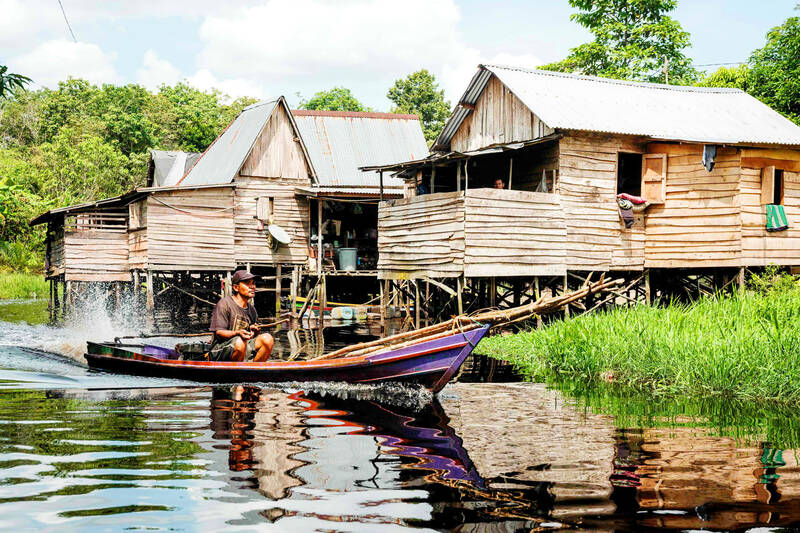Indonesian environmentalist Pralensa steered his boat through a shallow canal in the marshy peatlands near his village, an environment he fears might soon disappear.
His oar stirred up rich organic material in the brackish water, evidence of the layers of plant matter that make peatlands vital carbon dioxide stores and key to biodiversity.
Indonesia has more tropical peatland than any other country, but it is also quickly losing this poorly understood ecosystem.

Photo: AFP
That affects local residents and wildlife, and also has global impacts, because converted peatland could release vast quantities of planet-warming carbon dioxide.
Just 18.4 percent of Indonesia’s peatlands remain “undisturbed,” a 2023 study found, with vast tracts now palm oil or timber plantations.
Pralensa worries a similar fate awaits much of the swampy peatland around his village of Lebung Itam in South Sumatra.
Locals said palm oil firm Bintang Harapan Palma has already begun digging canals to drain the peatlands for planting.
“We protested... we told them this is a community-managed area,” Pralensa said. “According to them, they already have rights to this land.”
Peatlands are an in-between place — seemingly neither water nor land — an environment that slows plant decomposition and forms carbon-rich peat.
Covering just 3 percent of the world’s surface, they hold an estimated 44 percent of all soil carbon.
Indonesia’s peatlands are home to endangered orangutans and economically important fish species. They also help prevent flooding and drought, lower local temperatures and minimize saltwater intrusion.
Indonesia’s peatland has long been converted for agriculture, drained of the water that is its lifeblood, with severe consequences.
Dry peat is highly flammable, and fire could smoulder underground and reignite seemingly at will.
Peatlands were a leading cause of Indonesia’s catastrophic 2015 fires, which burned through an area about 4.5 times the size of Bali and cost the country about US$16.1 billion, or about two percent of GDP, the World Bank said.
The blazes sparked calls for action, including a moratorium on new peatland concessions.
Government regulations adopted the following year banned several damaging activities, including burning and drying out peatland.
“Weak oversight and law enforcement in Indonesia allow the exploitation of peatlands to continue,” said Wahyu Perdana, an advocacy and campaign manager at peatland preservation non-governmental organization Pantau Gambut.
Fires still happen “almost every year,” said Rohman, a farmer in Bangsal village.
Like Lebung Itam, Bangsal is ringed by plantations on converted peatland.
Bangsal residents could once rely on vast wetlands to feed their distinctive buffalo, which dive beneath the water to graze.
Fish traps supplied additional income, along with small rice paddies.
Now, buffalo are hemmed in by plantations, while fish are affected by walls that keep the plantations dry, and fertilizers and herbicides flushed out by rain.
Plantation infrastructure prevents water from subsiding properly when the rains end, complicating rice planting. Then there is the seasonal haze.
“It is difficult to do anything” when it descends, Rohman said, with visibility sometimes dropping to just a few meters.
Everything from “economic activity to children playing and learning is very disrupted,” he added.
Rohman was one of several plaintiffs from Bangsal and Lebung Itam who filed a landmark lawsuit over the fires.
They said that three companies with nearby timber plantations on peatland bore legal responsibility for the health, economic and social impacts of local fires.
Filing the suit was not an easy decision, Bangsal schoolteacher Marda Ellius said, and alleged that a company named in the case offered her money and help for her family if she withdrew.
“I kept thinking that, from the beginning, my goal here was for the environment, for many people,” she said. “I chose to continue.”
This month, a local court rejected the suit, saying the plaintiffs lacked standing.
“The pain cannot be described,” plaintiff Muhammad Awal Gunadi said. “It was tough because we were facing corporations.
The group has pledged to appeal, and Bangsal’s villagers are lobbying local government for a new designation to protect their remaining peatland.
Healthy peat is “like the lungs of the Earth,” Bangsal resident and buffalo farmer Muhammad Husin said.
“Hopefully, if we protect nature, nature will also protect us,” he said.

LANDMARK CASE: ‘Every night we were dragged to US soldiers and sexually abused. Every week we were forced to undergo venereal disease tests,’ a victim said More than 100 South Korean women who were forced to work as prostitutes for US soldiers stationed in the country have filed a landmark lawsuit accusing Washington of abuse, their lawyers said yesterday. Historians and activists say tens of thousands of South Korean women worked for state-sanctioned brothels from the 1950s to 1980s, serving US troops stationed in country to protect the South from North Korea. In 2022, South Korea’s top court ruled that the government had illegally “established, managed and operated” such brothels for the US military, ordering it to pay about 120 plaintiffs compensation. Last week, 117 victims

China on Monday announced its first ever sanctions against an individual Japanese lawmaker, targeting China-born Hei Seki for “spreading fallacies” on issues such as Taiwan, Hong Kong and disputed islands, prompting a protest from Tokyo. Beijing has an ongoing spat with Tokyo over islands in the East China Sea claimed by both countries, and considers foreign criticism on sensitive political topics to be acts of interference. Seki, a naturalised Japanese citizen, “spread false information, colluded with Japanese anti-China forces, and wantonly attacked and smeared China”, foreign ministry spokesman Lin Jian told reporters on Monday. “For his own selfish interests, (Seki)

Argentine President Javier Milei on Sunday vowed to “accelerate” his libertarian reforms after a crushing defeat in Buenos Aires provincial elections. The 54-year-old economist has slashed public spending, dismissed tens of thousands of public employees and led a major deregulation drive since taking office in December 2023. He acknowledged his party’s “clear defeat” by the center-left Peronist movement in the elections to the legislature of Buenos Aires province, the country’s economic powerhouse. A deflated-sounding Milei admitted to unspecified “mistakes” which he vowed to “correct,” but said he would not be swayed “one millimeter” from his reform agenda. “We will deepen and accelerate it,” he

Japan yesterday heralded the coming-of-age of Japanese Prince Hisahito with an elaborate ceremony at the Imperial Palace, where a succession crisis is brewing. The nephew of Japanese Emperor Naruhito, Hisahito received a black silk-and-lacquer crown at the ceremony, which marks the beginning of his royal adult life. “Thank you very much for bestowing the crown today at the coming-of-age ceremony,” Hisahito said. “I will fulfill my duties, being aware of my responsibilities as an adult member of the imperial family.” Although the emperor has a daughter — Princess Aiko — the 23-year-old has been sidelined by the royal family’s male-only